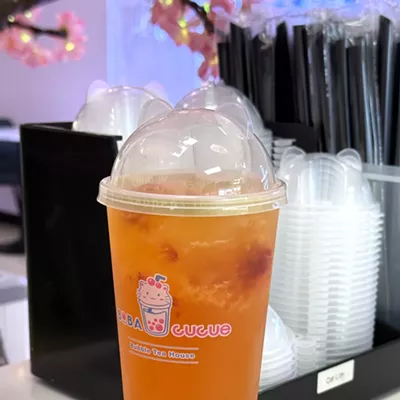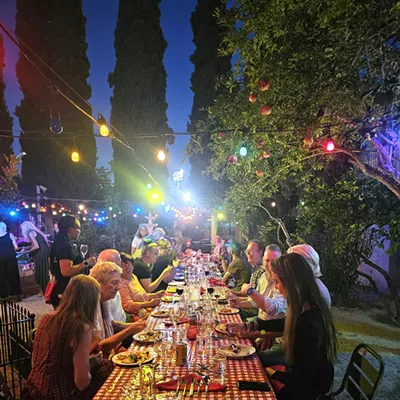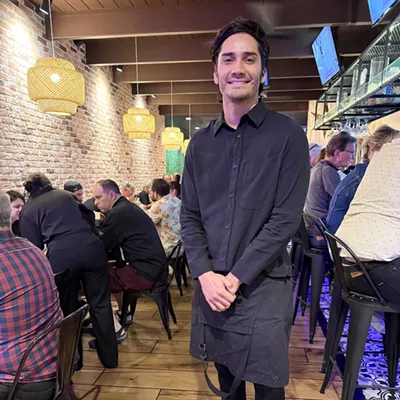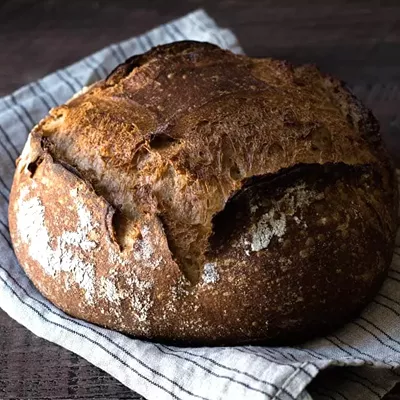So there you are, in the kitchen wondering what to feed your family. Jon Wirtis faces that dilemma on a daily basis except his family is much bigger than yours. As executive chef of Caridad Community Kitchen, Wirtis and his small army of volunteers and students put together some 1,400 sack lunches each week along with 2,500 hot meals.
“There’s a lot of moving parts to our busy operation,” says the kitchen honcho, a graduate of the Culinary Institute of America and a veteran of three decades preparing healthy and creative cuisine. “As part of the Community Food Bank of Southern Arizona, our overall mission is to help those in need. Some of our recipients may be homeless, but a lot of them come from the ranks of the working poor. By us providing them with a meal, it frees up part of their food budget that can go toward paying rent. Food boxes go to families that can take them home and cook. We’re like a banquet house that sends out cooked and ready-to-serve supper to churches and shelters.”
And there’s never a break in that effort. The Southern Arizona Food Bank provides food and food-related services in five southern counties—over 24,000-square-miles—with an estimated 63,000 meals distributed daily.
“We account for between 14,000 and 18,000 of those meals each month,” says Wirtis, acknowledging the need continues to grow. Currently, 1 in 4 children, 1 in 5 adults and 1 in 7 seniors struggle with hunger. “When I got here four years ago, we served six to seven thousand monthly meals, a number than has now doubled. And that’s just the tip of the proverbial iceberg. There’s a greater need out there that we’re currently unaware of.”
What goes out the swinging kitchen doors is a balanced menu that knows no caste system—protein, grains, fruits and veggies as required under the umbrella of Feeding America. “A visiting CEO from the Foothills who joins us for lunch or a homeless person living under a bridge who receives a supper—the meal is the same.” If you’re still feeling left out, there’s a relatively new social enterprise called Caridad Catering—Food for the Social Good. “We help fund our overall program through this catering operation that hires our own program graduates. And it’s working ... we’ve done $80,000 in revenue in our first fiscal year.”
Menus are made up daily because 80 percent of the food stock is donated.
“We’re like the TV show ‘Chopped,’” Wirtis says. “We get a mystery basket every day from donations of food that doesn’t sell in the supermarket, like chicken thighs that come to us frozen. I’ll stockpile them until I get enough to fill 700 plates. An Alaskan seafood vendor once gave us 800 pounds of salmon and we delivered up some pretty nice grilled fish. We also had 1,400 pounds of surplus lamb and our challenge was to find 101 ways to cook it. If you give me 500 pounds of rutabagas, I’ll find something to do with them—cook them, steam them, puree them, or make a stew out of them. Nothing goes to waste here.”Wirtis says he deals daily with two lines of hunger, the line of hungry people you want to feed and the line of unemployed whose numbers you want to shorten by finding them a job. Enter their Culinary Training Program. As a former instructor for Cordon Bleu, the executive chef started offering an innovative 10-week program, offering classroom and hands-on training to help gain confidence, discover true potential and increase marketability. Students have to be low- or no-income with barriers to employment like homelessness or coming out of prison or rehab, who can graduate with entry-level cooking skills.
“They learn both the fundamentals and nuances of food preparation,” says Wirtis. “We have about 100 graduates to date with an 80 to 85 percent placement rate in various local restaurant kitchens like Skyline Country Club, Starr Pass Marriott and Canyon Ranch.”
As to Caridad’s future, given space, manpower and money, Wirtis says it could grow exponentially. For now, “We continue to fine-tune, to get better at what we do. Cooking is a career of passion. You do it because of a love of food and the people it serves (currently up to 18,000 a month) in line with our goal of feeding many, helping people eat well and making sure no one goes to bed hungry.”
Caridad Community Kitchen (a program of the Community Food Bank of Southern Arizona), 845 N. Main Ave., 882-5641. ■







